'Fifteen days ago, we were only talking of Ayodhya. Now we are talking about farmers.'

The absence of Bharatiya Kisan Union leader Rakesh Tikait from the Sanyukt Kisan Morcha (non-political)-led latest farmers' protest is a noticeable void.
Tikait, who was at the forefront of the 2020-2-21 farmers' protest, has been conspicuously missing since farmers began their 'Dilli Chalo' march.
Tikait's tearful appeal had previously moved his elder brother, Naresh Tikait, to rally hundreds of thousands of farmers on January 27, 2021 -- a day after unsettling scenes at the Red Fort when police action was anticipated against protesting farmers at various Delhi borders.
His recent silence is as significant as his previous tears.
Naresh Tikait recently stated: 'Our full moral support is with the protesting farmers,' but declined to explain why he and his brother were not part of the 'Dilli Chalo' call by the Sanyukt Kisan Morcha (non-political).
The division among the farmers became evident when a parallel Bharat Bandh call by the SKM (political) was given for February 16.
Harmeet Singh Qadian, a farmer leader who was part of the earlier protest but is keeping away this time, claimed: "The ones who began their protest on February 13 are the same people who were responsible for the Red Fort violence on January 26, 2021.
"We support their right to protest. But we aren't with them."

Professor Jagmohan, a close observer of Punjab affairs and the farmers' protest, said: "In my opinion, the SKM (non-political) itself is political. Elements from among them are the ones who stormed the Red Fort on January 26, 2021, when hundreds of thousands of farmers were protesting peacefully."
Following the death of 78-year-old farmer Gian Singh at the Shambhu border (between Haryana and Punjab), Tikait broke his silence while protesting at the Dehradun-Muzaffarnagar highway near Baagowali Chauraha.
He warned, 'Dilli door nahi hai. On February 26 and 27, we will do a tractor march up to the Ghazipur border of Delhi. However, one side of the road will remain open for commuting.'

Professor Sukhwinder Singh, who has worked with grassroots organisations in Punjab, commented: "They may appear to be divided. But that is how it was in 2020.
"A group of farmers forced their way into the Red Fort while others protested peacefully. It was Tikait's tears that galvanised the protest. Had he not cried, the protest might have taken a different turn."
He further said the death of a farmer has agitated other farmers, and there is a likelihood of convergence.

But Punjab-based sociologist Manjit Singh observed: "The protest may not match the optics of the farmers' protest that began in November 2020.
"But it has awakened everyone from their deep slumber -- the Centre, political parties, the media, and civil society who seemed to be asking no questions of the government months away from the 2024 general elections.
"It may not rattle the Centre, and nothing is likely to come of it since there will be no Parliament session soon, but it is slowly becoming the conversation and may change the narrative.
"After all, a week is a long time in politics. Fifteen days ago, we were only talking of Ayodhya. Now we are talking about farmers."
He believes that even the protesting farmers know nothing will come of this agitation before the Lok Sabha elections.
"One has to realise that such movements do not yield immediate results. These movements are long-drawn and protracted.
"What it has done now is that it has brought the media attention back to farmers from other emotive issues like Ram Mandir."

Professor Kanwalpreet, professor of political science at the DAV College Chandigarh, summed up the issue.
"If this farmers' protest has forced Congress leader Rahul Gandhi to return to Delhi, leaving his Nyay Yatra, it means it has already overshadowed the yatra, and the Congress wants to be seen as participating in it, as do other political parties.
"If this protest continues long enough, it will slowly force people away from religion to real issues like agriculture, employment, health, education, etc."
Feature Presentation: Ashish Narsale/Rediff.com


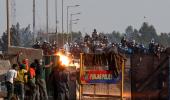
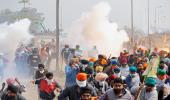
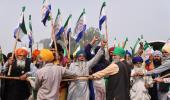




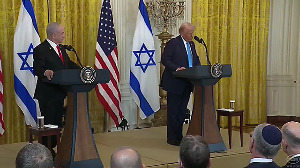
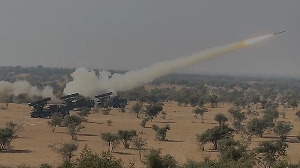
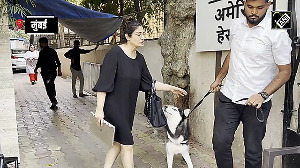
 © 2025
© 2025